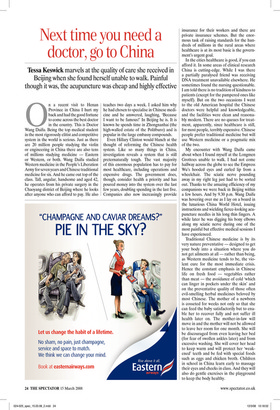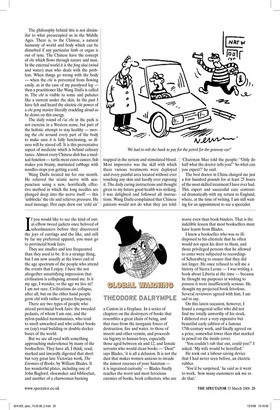Next time you need a doctor, go to China
Tessa Keswick marvels at the quality of care she received in Beijing when she found herself unable to walk. Painful though it was, the acupuncture was cheap and highly effective On a recent visit to Henan Province in China I hurt my back and had the good fortune to come across the best doctor in the country. This is Doctor Wang Daifu. Being the top medical student in the most rigorously elitist and competitive system in the world is serious. Just as there are 20 million people studying the violin or engineering in China there are also tens of millions studying medicine — Eastern or Western, or both. Wang Daifu studied Western medicine in the People’s Liberation Army for seven years and Chinese traditional medicine for six. And he came out top of the class. Tall, angular, handsome and aged 42, he operates from his private surgery in the Chaoyang district of Beijing where he looks after anyone who can afford to pay. He also teaches two days a week. I asked him why he had chosen to specialise in Chinese medicine and he answered, laughing, ‘Because I want to be famous!’ In Beijing he is. It is known he spends time in Zhongnanhai (the high-walled estate of the Politburo) and is popular in the large embassy compounds.
Even Hillary Clinton would blanch at the thought of reforming the Chinese health system. Like so many things in China, investigation reveals a system that is still preternaturally tough. The vast majority of this enormous population has to pay for most healthcare, including operations and expensive drugs. The government does, though, consider health a priority and has poured money into the system over the last few years, doubling spending in the last five. Companies also now increasingly provide insurance for their workers and there are private insurance schemes. But the enormous task of raising standards for the hundreds of millions in the rural areas where healthcare is at its most basic is the government’s urgent goal.
In the cities healthcare is good, if you can afford it. In some areas of clinical research China is cutting-edge. While I was there a partially paralysed friend was receiving DNA treatment unavailable elsewhere. He sometimes found the nursing questionable. I am told there is no tradition of kindness to patients (except for the pampered ones like myself). But on the two occasions I went to the old American hospital the Chinese doctors were helpful and knowledgeable, and the facilities were clean and reasonably modern. There are no queues for treatment, apparently, since healthcare is still, for most people, terribly expensive. Chinese people prefer traditional medicine but will use Western medicine or a pragmatic mix of the two.
My encounter with Wang Daifu came about when I found myself at the Longmen Grottoes unable to walk. I had not come halfway across the globe to see the Empress Wu’s hooded eyes and curled lip from a wheelchair. The sciatic nerve pounding away in my right leg just had to be sorted out. Thanks to the amazing efficiency of my companions we were back in Beijing within a few hours. And by 9.30 p.m. Wang Daifu was hovering over me as I lay on a board in the luxurious China World Hotel, issuing instructions and wielding fierce-looking acupuncture needles in his long thin fingers. A while later he was digging his bony elbows along my sciatic nerve during one of the most painful but effective medical sessions I have experienced.
Traditional Chinese medicine is by its very nature preventative — designed to get your body into a situation where you do not get ailments at all — rather than being, as Western medicine tends to be, the violent cure for the most immediate crisis. Hence the constant emphasis in Chinese life on fresh food — vegetables rather than meat — the avoidance of cold ‘which can linger in pockets under the skin’ and on the preventative quality of those often evil-smelling herbal medicines beloved by most Chinese. The mother of a newborn is cosseted for weeks not only so that she can feed the baby satisfactorily but to enable her to recover fully and not suffer ill health later on. The mother-in-law will move in and the mother will not be allowed to leave her room for one month. She will be discouraged from even leaving her bed (for fear of swollen ankles later) and from excessive washing. She will cover her head to keep warm and will protect her ‘weakened’ teeth and be fed with special foods such as eggs and chicken broth. Children in school in China learn early to massage their eyes and cheeks in class. And they will also do gentle exercises in the playground to keep the body healthy. The philosophy behind this is not dissimilar to what preoccupied us in the Middle Ages. There is, to the Chinese, a natural harmony of world and body which can be disturbed if any particular limb or organ is out of sync. The Chinese have the concept of chi which flows through nature and man. In the external world it is the feng shui (wind and water) man who deals with the problem. When things go wrong with the body — when the chi is prevented from flowing easily, as in the case of my paralysed leg — then a practitioner like Wang Daifu is called in. The chi is visible to some and pulsates like a current under the skin. In the past I have felt and heard the electric chi power of a chi gong master literally crackling aloud as he draws on this energy.
The daily round of t’ai chi in the park is not exercise in a Western sense, but part of the holistic attempt to stay healthy — moving the chi around every part of the body to make sure it is fully functioning, so illness will be staved off. It is this preventative aspect of medicine which is behind culinary tastes. Almost every Chinese dish has a medical function — turtle meat cures cancer, fish makes you brainy, marinated cabbage with noodles stops you getting a cold.
Wang Daifu treated me for one month. He relieved the sciatic nerve with acupuncture using a new, horrifically effective method in which the long needles are plunged deep into the nerve itself — this ‘unblocks’ the chi and relieves pressure. He used massage. Hot cups drew out ‘cold air’ trapped in the system and stimulated blood. Most impressive was the skill with which these various treatments were deployed and every painful area located without ever touching any skin and hardly ever exposing it. The daily caring instructions and thought given to my future good health was striking. I was delighted and followed all instructions. Wang Daifu complained that Chinese patients would not do what they are told: ‘Chairman Mao told the people: “Only do half what the doctor tells you!” So what can you expect?’ he said.
The best doctor in China charged me just a few hundred pounds for at least 25 hours of the most skilled treatment I have ever had. This expert and successful care contrasted dramatically with my return to England, where, at the time of writing, I am still waiting for an appointment to see a specialist.



























































































 Previous page
Previous page